8 Best Fertilizers for Bermuda Grass in 2023 - How to Choose
Written by Ivy
Dec 14 2022
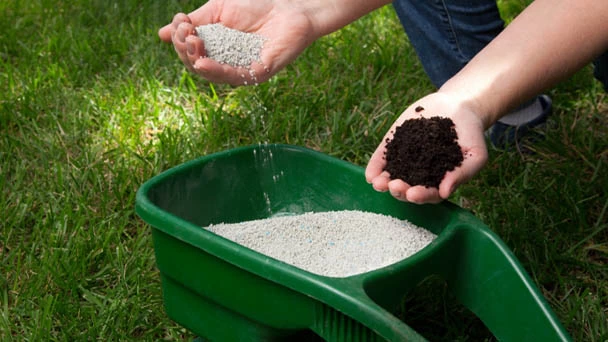
Following the buyer guide outlining what to look for in a Bermudagrass fertilizer, these are the top fertilizers for Bermudagrass based on quality and value, which Bermuda grass has shown to be fairly resilient. This type of sod also has the advantage of requiring little reseeding and being perennial in colder climates. Particularly when these healthy lawns are fertilized with the best Bermuda grass fertilizer available.
Best Fertilizers for Bermuda Grass Overview
- Best Overview: Milorganite 0636 Nitrogen Fertilizer
- Best Bang For The Buck: Safer Brand Lawn Restore Fertilizer
- Best Organic: The Andersons PGF Complete Fertilizer with Humic DG
- Best With Sprayer: Scotts Turf Builder Southern Lawn Food
- Best For Nitrogen: Pennington Smart Seed Bermudagrass Seed and Fertilizer Mix
- Best For Lush Lawns: Scotts Southern Turf Builder Lawn Food 26-2-13
- Best For Drainage Poor Soil: Scotts EZ Seed Patch And Repair Bermuda Grass 1-0-0
- Best For Experience Lawn: The Andersons Professional Fertilizer 16-4-8
Top 5 Fertilizers for Bermudagrass – Reviews
1. Milorganite 0636 Nitrogen Fertilizer
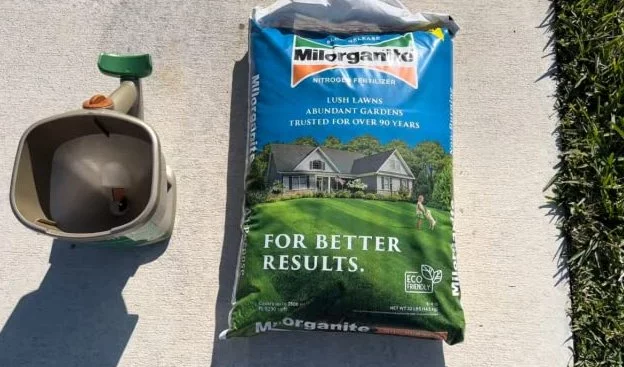
Pros
- Cost-effective
- Adds organic matter to the soil
- Contains no salt, so it won't dry out grassroots
- Long-lasting effects
Cons
- Contains no potassium (one of the most important plant nutrients)
- Does contain phosphorus, so not an option in states with a phosphorus fertilizer ban
The nitrogen fertilizer from Milorganite is a sustainable option for your lawn that feeds the grass while also improving the soil. This nitrogen fertilizer contains organic material that decomposes in the soil to support good microorganisms and strengthen the soil's structure.
While doing so, this fertilizer promotes the growth of lush, green grass by providing just the right amount of iron and nitrogen for your lawn without burning the grass. Milorganite 0636 is also incredibly inexpensive, especially for organic fertilizer, for everything it can do.
Specifications:
- Type: Granular fertilizer
- NPK ratio: 6-4-0
- Time release: Slow-release
- Effective period: 10 weeks
- Package size: 32 lbs
- Coverage area: 2,500 square feet
2. Safer Brand Lawn Restore Fertilizer
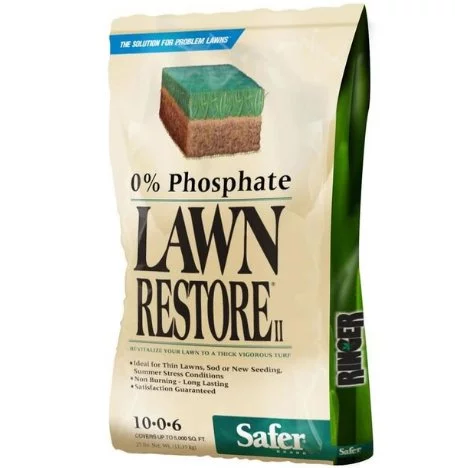
Pros
- Provides nutrients from all-natural materials (such as feather meal and blood meal)
- Pet-friendly and kid-friendly
- Phosphate-free
Cons
- Not OMRI-listed
- Lawn Restore III has an unpleasant smell that earlier versions of the product didn't have
An additional organic choice that benefits both your soil and your Bermudagrass is Lawn Restore fertilizer from Safer Brand. Because it contains no phosphate, this fertilizer won't contaminate water supplies and is legal in all 50 states. In addition, after you apply it to the lawn, it is secure around pets and young children.
This fertilizer supports a deep, healthy root system, which will help your Bermudagrass withstand drought stress and extreme temperatures despite the fact that it doesn't contain phosphorus (the nutrient typically associated with root growth). Additionally, your grass will start to green up three to five days after application.
Specifications:
- Type: Granular fertilizer
- NPK ratio: 9-0-2
- Time release: Slow-release
- Effective period: 8 weeks
- Package size: 20 lbs
- Coverage area: 5,000 square feet
3. the Andersons PGF Complete Fertilizer With Humic DG
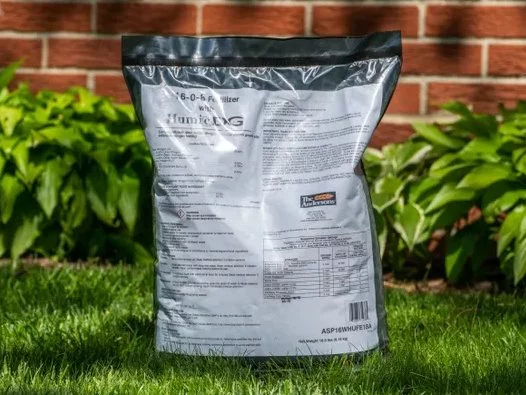
Pros
- Packed with soil nutrients, including micronutrients (not just NPK)
- Improves your grass's ability to absorb nutrients
Cons
- Expensive
- Not for use in states with a ban on phosphorus fertilizers
For homeowners who are serious about lawn care and are prepared to pay more to prove it, The Andersons Fertilizer with Humic DG is a professional-grade fertilizer. What precisely do you get for the high price tag, then?
One benefit of this fertilizer is that it is complete and balanced, containing the right amounts of all three of the most vital plant nutrients (nitrogen, phosphorus, and potassium) for most lawns, including Bermudagrass. Another advantage is the fertilizer's ultra-fine particles, which guarantee even distribution and make it easier for it to meld with your soil.
A proprietary soil amendment called Humic DG, which contains both humic and fulvic acid, is also a benefit. By enhancing the absorption of soil nutrients by your grass, these organic compounds ensure that all fertilizer is utilized.
Specifications:
- Type: Granular fertilizer
- NPK ratio: 16-4-8
- Time release: Slow-release
- Effective period: 8 weeks
- Package size: 18 lbs
- Coverage area: 5,000 square feet
4. Scotts Turf Builder Southern Lawn Food
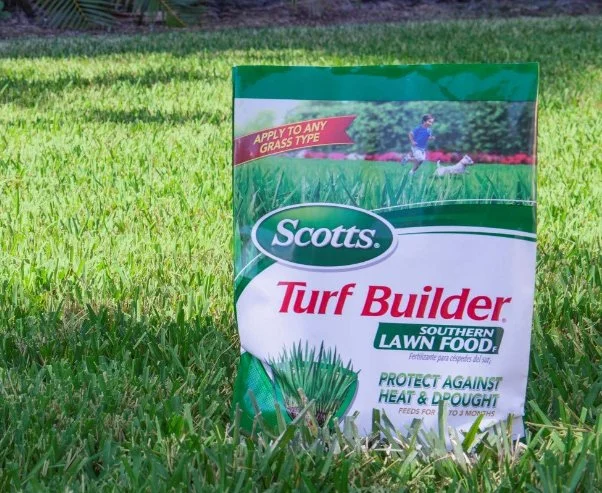
Pros
- Boosts root growth and green grass growth through harsh summers
- Safe for kids and pets immediately after you apply it to the lawn
- Includes Scotts patented All-in-One particles for even distribution of nutrients
- Phosphate-free
Cons
- Not good for soils with a phosphorus deficiency
- Large amount of nitrogen will burn grass and turn it brown if you over-fertilize any spots by mistake
Warm-season grasses that grow in the South, like Bermuda, are ideal for Scotts Turf Builder Southern Lawn Food because it is specifically made to boost healthy growth through intense heat and drought. It's a great option for fertilizing in the summer and can lessen the amount of water your lawn needs to survive the hottest time of the year.
For the deep green lawn of your dreams, use this fertilizer, which has a high nitrogen content. Additionally, it contains a sizable amount of potassium, which promotes the general health of plants. Since this fertilizer doesn't contain phosphorus, it won't harm aquatic ecosystems as much when it rains and gets into natural bodies of water.
Specifications:
- Type: Granular fertilizer
- NPK ratio: 32-0-10
- Time release: Slow-release
- Effective period: 6 weeks
- Package size: 14 lbs
- Coverage area: 5,000 square feet
5. Pennington Smart Seed Bermudagrass Seed and Fertilizer Mix
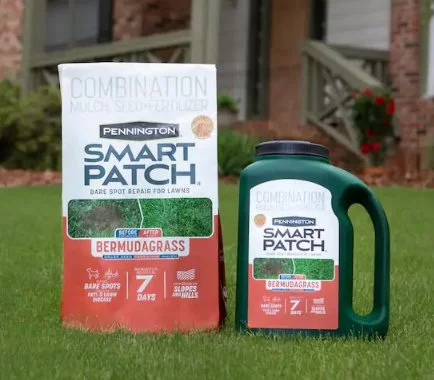
Pros
- Repairs patchy lawns
- Helps Bermudagrass crowd out weeds
- Works quickly
Cons
- Mostly for overseeding rather than just fertilizing
- Only effective if applied in spring or early summer
Has your lawn dried out as a result of pet damage, high foot traffic, or a drought? These bare patches can be filled in with the Bermudagrass seed and fertilizer mixture. It's also great for thickening up your lawn by overseeding. The fertilizer provided will help young Bermudagrass seedlings develop into robust plants.
Spreading this seed and fertilizer mixture is best done in the spring or early summer. In as little as 10 to 14 days, your new grass should start to grow. For quicker results than you get when planting Bermudagrass alone, the mixture also contains a cool-season grass.
Specifications:
- Type: Fertilizer-coated grass seed
- NPK ratio: 1-0-0
- Time release: Slow-release
- Effective period: 6 weeks
- Package size: 8.75 lbs
- Coverage area: 2,500 square feet if planting all-new grass; 5,000 square feet if overseeding an established lawn
6. Scotts Southern Turf Builder Lawn Food 26-2-13
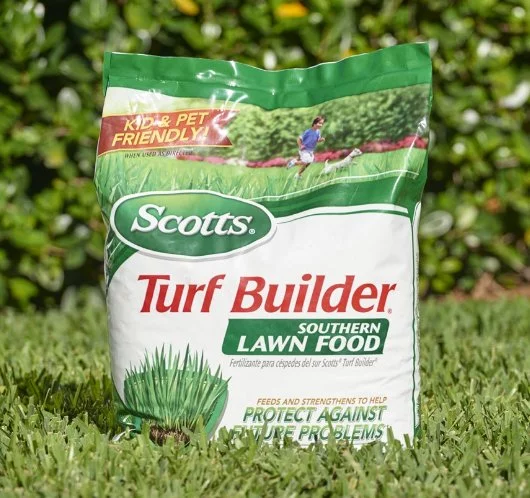
Pros
- Repairs damage from heat stress caused by extreme heat
- Encourages strong root growth and enables the turf to retain more moisture even during periods of drought
Cons
- Not recommended for use on already heavily-fertilized soil
If Scotts tried, it would be impossible to make Turf Builder Southern Lawn Food more specifically designed for Bermuda grass. Your turf will be protected from extreme heat and drought thanks to its N-P-K blend of 26-2-13, which also promotes strong, healthy root growth and more vibrant color.
However, I believe they are well worth the small investment because they last for years, and let's face it, Bermuda grass will need to be nourished on a continuing basis throughout each growing season. As you might expect, you must use this fertilizer with a spreader tool for optimal and the evenest coverage.
How To Use: Scott's turf measuring app is available for free download from an app store and will provide you with the precise usage and coverage requirements for your turf. The effectiveness and outcomes of these granules are unaffected by the lawn being wet or dry. Spread evenly over the entire area, working your way in from the outside perimeter.
7. Scotts EZ Seed Patch and Repair Bermuda Grass 1-0-0
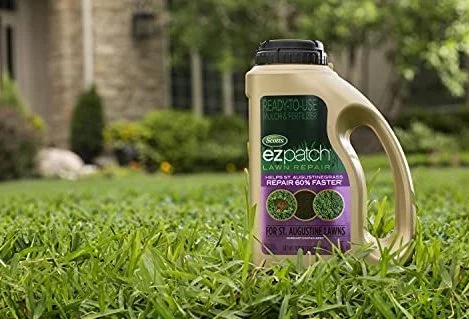
Pros
- Effective combination of mulch, seed, and fertilizer
- Patented seed technology for fast germination
Cons
- Best used for spot-treating problem areas and not for use with large-scale projects
Scotts EZ seed patch and repair is specifically designed to support the unique requirements of Bermuda grass. In my experience, Bermuda grass withstands the stresses of extreme heat and drought fairly well, but when my dogs spend a lot of time there in the summer, that's when this convenient, resealable bag emerges from under my potting bench.
I can love my dogs and my Bermuda grass at the same time thanks to the combination of seed (which absorbs an amazing 6X its weight in water) and slow-release feed that accelerates growth. Each seed is covered in a sticky, protective layer that prevents it from being washed away and shields the seedlings from disease and pests once they have germination. All of this is done while preserving the natural characteristics of Bermuda grass, such as its tolerance of heat, drought, and traffic.
8. The Andersons Professional Fertilizer 16-4-8
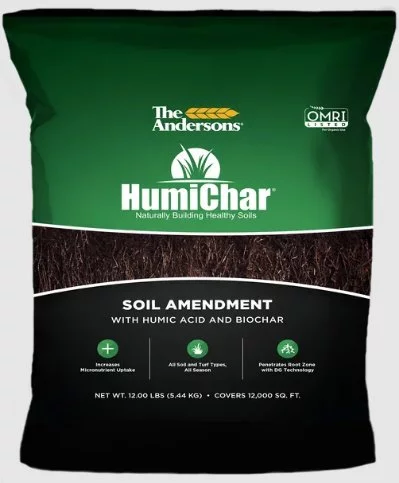
Pros
- Ultra-fine pellets for more effective coverage
- Slow-releasing, fewer applications required for a greener lawn
Cons
- Not recommended for severely ailing lawns that may need more nitrogen
It's wonderful when homeowners can benefit from professional-caliber outcomes similar to those found on sports fields and golf courses without having to pay a high price. The Andersons' slow-release lawn fertilizer has ultra-fine particles for twice as much coverage per square foot.
Humic and fulvic acids are also added to the 16-4-8 NPK to increase its effectiveness. In just 6-14 days, an improved nutrient absorption and processing system gave a lawn a thick, green layer.
What to Consider When Choosing the Best Fertilizer for Bermuda Grass
For many varieties of Bermuda grass to grow to their full potential, fertilizing is only necessary once or twice a growing season. The Midway, Tifway, or Tifgreen varieties of the new hybrid Bermuda grass will benefit from more frequent applications. Bermuda grass responds favorably to several commercial turf fertilizers. The choice of application type or preference for natural versus chemical ingredients is up to the lawn caretakers.
Fertilizer Types
There are three main types of lawn fertilizers: granular, liquid, and water-soluble. Every one has advantages and disadvantages.
- Liquid: Bermuda grass receives a quick boost of nutrients from this kind of fertilizer. Because foliage is the fastest route for nutrients to enter a plant, grass absorbs liquid fertilizers through it. However, this transient fertilizer may need to be applied more frequently to the grass. For use with a garden-style pump sprayer or hose-end dispenser, liquid fertilizers are available in full-strength and concentrated forms.
- Granular: Small pebble-shaped dry granular fertilizers are available for push-type spreaders to apply. Some formulations disintegrate gradually to release nutrients gradually. Granular fertilizers don't provide the same immediate results as liquid fertilizers, but they may have longer-lasting effects and require fewer applications overall.
- Water-soluble: In the form of sand-like particles that dissolve quickly in water, water-soluble fertilizers are sold in packages. An end-of-hose dispenser receives the product. The lawn care provider can then simultaneously fertilize and water the grass in this manner. Small yards that a hose can easily access are good candidates for this kind of fertilizer.
NPK Ratio
Commercial fertilizers for lawns and yards include premeasured amounts of nitrogen (N), which promotes the growth of leafy greens, phosphorus (P), which is essential for the production of flowers and fruits, and potassium (K), which improves overall plant health. The weights of these three nutrients are listed on the fertilizer package.
The best fertilizer for Bermuda grass has a high nitrogen content, little to no phosphorus, and possibly a trace amount of potassium. As an illustration, an NPK ratio of 16-0-8 contains 16% nitrogen, 0% phosphorus, and 8% potassium. For Bermuda grass, this ratio is excellent.
Organic Vs. Synthetic
Most lawn fertilizers contain synthetic, or "inorganic," ingredients, but a handful of options contain natural ingredients.
- Organic: Natural lawn fertilizers are mixtures of non-chemical nutrients like compost, livestock manure, earthworm castings, and poultry manure. Because it takes more effort to gather, prepare, and produce fertilizer from these ingredients, they frequently cost more. Granular organic fertilizers are the norm. If these natural products leak into waterways, neither plants nor aquatic life will be harmed.
- Synthetic: Synthetic fertilizers, which are created in a lab using chemicals or synthetic variations of natural ingredients, contain concentrated nutrients like potassium, sulfur, and nitrogen. Some products have additional minerals like calcium or boron to improve soil health. If synthetic fertilizer runoff enters watercourses and ponds, it may endanger fish.
Application
After late spring or early summer, when the grass is fully green, the first fertilizer application of the year should be made. Growers can now, in accordance with the directions on the package, apply an all-purpose lawn fertilizer with a high ratio of nitrogen (the N number in N-P-K). After fertilizing, wait two weeks before overseeding with additional Bermuda grass seed. Bermuda grass might benefit from a second fertilization in the middle of the summer.
Apply a third round of fertilizer in the autumn. Use a lawn fertilizer that contains potassium in addition to nitrogen for a fall application, such as a 15-0-8 formula. Before going dormant for the winter, the extra potassium will help the grass maintain its strength and resistance to disease.
Consider having the soil tested for deficiencies and adding additional nutrients as necessary for the best long-term results. Growers can bring soil samples to their local County Extension Agency for a thorough soil test and nutrient recommendations in the majority of communities.
Our Verdict
The Milorganite 0636 Nitrogen Fertilizer is among the most trustworthy products available. It comes in a sizable 14-pound bag, provides a ton of coverage (up to 5,000 square feet), and is very simple to use. For customers who prefer to use a sprayer, take into account this liquid alternative from Safer Brand Lawn Restore Fertilizer, which comes in its own spray bottle and has enough solution to cover up to 3,200 square feet.
FAQs
Bermuda grass lawns benefit from warm weather, but if they lack the right nutrients, they could appear sickly and sparse. Bermuda grass lawns are boosted by a quality turf fertilizer, which also promotes dense green growth. Here are the most frequently asked questions about the top fertilizer for Bermuda grass so you can decide on a product.
What is the Best Fertilizer for Bermuda Grass in Oklahoma?
No doubt, Milorganite is the best organic, high nitrogen, slow-release fertilizer for turfgrasses like Bermuda grass. N-P-K 6-4-0 stands for 6% nitrogen, 4% phosphorus, and 0% potassium in the chemical formula.
Best Fertilizer for Bermuda Grass in North Texas
The majority of lawns, especially Bermuda lawns, require a lot of fertilizer, preferably a good slow-release high nitrogen fertilizer with iron and sulfur. We recommend our own Covington's Premium or High Performance lawn fertilizer for all common turf grasses in North Texas.
Best Fertilizer for Bermuda Grass in North Carolina
Use a low N, high potassium fertilizer like 5-10-30, or supplement with 1 pound of potash (K2O) per 1,000 square feet four to six weeks before expected frost using 11⁄2 pounds of muriate of potash (2 pounds of potassium sulfate (0-0-50) or KCl) (0-0-60).
Best Fertilizer for Bermuda Grass in Arizona
An optimal fertilizer for established lawns is one that is well-balanced and preferably has a high nitrogen analysis. If this describes your situation, opt for a fertilizer with an analysis of 16-8-4 for best results. For established Arizona lawns, 21-7-14, 26-4-2, or 24-0-4 are suitable alternatives.
How Often Should I Fertilize My Bermuda Grass?
Whether a fertilizer is a quick-release or slow-release formula will depend on the strength of the fertilizer. Fertilizer is typically required every 4 to 6 weeks for Bermuda grass.
When is the Best Time to Fertilize My Bermuda Grass?
Wait until Bermuda grass is completely green in the late spring before fertilizing. Depending on the strength of the fertilizer, reapply it in the middle of the summer and in the fall, or even more frequently.
How Do I Apply Fertilizer to My Lawn?
Apply liquid fertilizer using a hose-end sprayer or a sprayer with a pump. Apply granular fertilizers with a push-spreader.
Can I Apply Fertilizer to Wet Grass?
Yes, generally speaking. However, you might want to wait if it has recently rained heavily and water is still trickling off the lawn because the fertilizer might wash away.
Do You Have to Water After Fertilizing?
Before watering the lawn, most granular fertilizers can stay there for a few days, but always check the directions.
Latest Updated
- Benefits of Bugleweed - 7 Science-backed Health Benefits
- Bugleweed Dangers & Side Effects - Is It Poisonous?
- How to Plant Evergreen Trees - What You Should Know
- When to Plant Evergreens - Grow Guide for Evergreen Trees
- 12 Wonderful Evergreen Shrubs for Your Garden
- 12 Popular Evergreen Plants with Pictures for Beginners
- When And How To Prune A Lilac Bush Like a Pro
- How to Grow & Care for Lilac Vine (Hardenbergia Violacea)
- Japanese Lilac Tree (Syringa Reticulata) Care & Propagation Guide
- Shumard Oak Pros and Cons - What to Know
Popular Articles
- Winter maintenance of Antirrhinum Majus
- How to Grow Terminalia Mantaly Tree
- How to Grow and Care for Crossostephium Chinense
- How to grow Antirrhinum Majus in spring
- Peristeria Elata (Dove Orchid) Profile: Info & Care Guide
- Underwatered Snake Plant (Sansevieria Trifasciata) - Signs And How To Fix
- How to Care for Brazilian Jasmine Plant (Mandevilla Sanderi)
- How to Grow & Care for Graptopetalum Purple Delight in Summer
- Rosa Chinensis (China Rose): Plant Growing & Care Tips
- How to Care for Baby Sun Rose (Aptenia Cordifolia)